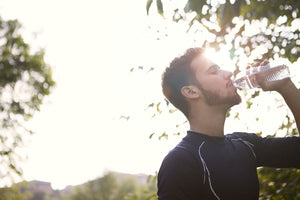Are you an avid coffee drinker? Then you’ve probably had people tell you to go easy on those refills when the weather’s hot, to avoid dehydration and headaches.
Yup – wherever there are coffee drinkers, there are people warning of dehydration. But is there any truth behind this common belief? We’ve taken a look at the science behind your favorite brew, to find out what’s really up with dehydration and coffee. And we’re about to spill the beans – all of them.
Does Coffee Dehydrate You?
The quick answer? No. According to multiple recent studies, coffee actually doesn’t make you dehydrated like once thought. This includes espresso, which often prompts the question: does espresso dehydrate you? The answer is similar to that of regular coffee.
But as is often the case, the full truth is a bit more complex than a simple yes or no. Besides, if it’s not true, where did these claims even come from? Great question – and we did promise to spill the beans, didn’t we? Let’s dig a little deeper into how caffeine affects dehydration.
What is Dehydration?
Simply put, dehydration is when your body loses more liquid than it takes in. In other words, when you’re dehydrated, your body is lacking enough fluid that it’s affecting the body.
 Typical signs of dehydration are:
Typical signs of dehydration are:
- Dry mouth, lips, and eyes
- Dark yellow urine
- Lightheadedness or dizziness
- Headache
- Feeling tired
- Noticable thirst
- Peeing very little (less than four times per day)
Dehydration can come about in many ways. The most common cause is not drinking enough while being active, like during and after exercise, or when it’s hot outside. These are situations that cause your body to lose more fluids than usual, and as a result, it needs extra hydration.
Some health conditions, such as diabetes, fever, and certain medicines can make you more easily dehydrated. Then, there are foods and drinks that cause the body to lose more fluids than usual, such as salty foods and alcohol.
Coffee itself is not dehydrating, so long as you’re drinking it in normal amounts – the recommended amount of coffee per day is no more than five regular cups, or six espressos. It can, of course, vary a little between individuals, but also between different coffees. Because one of the biggest factors to dehydration and coffee is caffeine.
Caffeine and Dehydration
Ah, dear old caffeine. The mood-boosting energy kick that gets us through those early mornings and afternoon slumps. Most of us are as passionate about our caffeine as we are about our coffee – but how does caffeine play into dehydration? And more specifically, why does caffeine dehydrate you, if at all?
When caffeine enters your body, it passes through the gut and the bloodstream, and finally reaches the liver. The liver is responsible for breaking the caffeine down into smaller compounds that boost your brain activity, muscle performance, and all that good stuff.
But it affects other organs too – and in this case, we’re mostly looking at caffeine’s effect on the kidneys. Since caffeine is a diuretic, it can lead to increased urine production, but does caffeine dehydrate you significantly? Let's explore.
Is Coffee a Diuretic?
Research shows that caffeine has a diuretic effect on the kidneys, especially if you’re drinking a lot of caffeine in a short time. This is because caffeine increases the blood flow to the kidneys, and in turn they release more fluids through urine.

Now, it’s important to know that dehydration and diuretic effects are not necessarily the same things, even though we often lump them together.
Dehydration is a bodily state, that occurs when your fluid levels are too low. A diuretic, on the other hand, is something that causes the body to produce more urine. While diuretics can cause dehydration, they don’t have to.
In fact, the very cause of this urban myth is a 1928 study, showing that those who drink coffee urinate about 50% more than those who don’t – but what they were actually measuring was the diuretic effect, not the fluid levels in the body.
And in the case of coffee, there typically isn’t enough caffeine to actually cause dehydration. If you’re already dehydrated when you drink coffee, then it might slightly worsen the condition, but it usually isn’t the real cause. Because coffee itself is also hydrating, and the so the fluid levels usually even out.
Caffeine Affects People Differently
Of course, caffeine affects everybody slightly differently. How much caffeine your body can take depends on size, age, and a whole lot of other factors – besides, some people are genetically very sensitive to caffeine, and could feel an effect even if they’re drinking less coffee than the average person.

So it’s worth paying attention to how your body reacts to caffeine, and what levels work best for you. But it’s also important to note that your body gets used to caffeine. Research shows that avid coffee drinkers don’t tend to feel the same diuretic effects from their daily refills as those who are new to coffee, or those that drink it more rarely.
But it’s also important to note that your body gets used to caffeine. Research shows that avid coffee drinkers don’t tend to feel the same diuretic effects from their daily refills as those who are new to coffee, or those that drink it more rarely.
Finally, there is one more factor to consider – namely, the amount of caffeine in the type of coffee you drink. Caffeine levels can differ between coffees, and while it shouldn’t have a great effect (again, normal levels of coffee drinking doesn’t have that big an effect) people who are sensitive could always try a coffee with less caffeine.
Do Certain Coffees Dehydrate More than Others?
The exact caffeine levels of coffee depends mostly on what beans you choose – Arabica beans have on average about 50% less caffeine than Robusta beans, for example. But how your coffee is prepared plays a role, too.

Regular Coffee
By regular coffee, we mean the hot-brewed or drip kind – the most common way to prepare coffee in the US. A regular-sized cup of coffee contain between 70-140 mg of caffeine, depending on the beans.
On average, this comes out to 95mg of caffeine per cup, and drinking 5 cups a day with this level of caffeine will have no significant dehydrating effect on most people.
Cold Brew
Cold brew coffee has the same amount of caffeine as a regular cup of coffee does – or in some cases, even higher!
But cold brew has a slow-release of caffeine into your system, which means it can give a more even release of the caffeine into your body, rather than a quick boost followed by an energy crash. This could, potentially, also mean that the diuretic reaction is slower and less noticable.
Espresso
An espresso, while small, is quite high in caffeine. One shot alone contains about 63mg of caffeine on average – not bad for such a small puncher. And while you might wonder, does espresso dehydrate you more than regular coffee, it's clear that in moderation, espresso won't significantly alter your hydration levels. Recommended levels are no more than six espressos per day.

Instant Coffee
Instant coffee is generally lower in caffeine than regular coffee is. In a normal-sized cup, there’s usually between 30-90mg of caffeine. So, compared to regular coffee, there’s definitely a difference.
But instant coffee contains acrylamide, which could have some serious health concerns if you’re drinking it on the regular. If you’re someone who picks instant coffee for convenience, then this is a pretty amazing alternative that is just as quick and much healther.
Decaf
Decaf, of course, has significantly less caffeine than any other type of coffee – as the name hints, the caffeine has been removed from the coffee before you brew and drink it.
If you’re sensitive to caffeine, or have a sensitive stomach in general, decaf could be the best alternative for you! That way, you don’t have to give up your coffee – or worry about constantly running to the bathroom.
Bottomline: Does Coffee Cause Dehydration?
The bottomline is that coffee doesn’t directly cause dehydration, but you should drink the recoommended daily amount of water if you are frequently drinking coffee.
The myth comes from a study made back in 1928, which found that those who drink coffee also urinate 50% more than those who don’t. But what they were measuring was the diuretic effect of coffee, not whether or not it causes dehydration – the fluids in coffee also hydrates the body, and compensates for the loss of fluid.
Many studies have since confirmed that regular coffee drinking – about 5 normal cups per day – is perfectly fine and doesn’t affect the body’s fluid levels in any noticable way.
Still, it’s important to stay hydrated throughout the day, and coffee can never replace water when it comes to rehydrating. If you’re feeling any typical signs of dehydration, opt for the water bottle first.
Peak State’s Immunity Boost – Sustainable Coffee with Benefits

Looking for a great cup of coffee to warm you through the colder months? Look no further than Peak State’s Immunity Boost – delicious, whole-bean coffee made with your health and the planet in mind.
Immunity Boost is shade-grown on FairTrade-certified, organic farms in Guatemala, for maximum flavor and minimal environmental impact. Even better, it’s packed with an immune-boosting blend of chaga, reishi, turkey tail, cordyceps and lion’s mane mushrooms, to support your health and immune system in a natural way.
Immunity Boost boasts notes of dark chocolate and sweet grape, and is naturally low-acid and gut friendly. Get your free sample delivered to your front door today!
Psst… How bad is instant coffee for your health, really? Check out this article where we deep dive into the health concerns behind the coffee of convenience!

